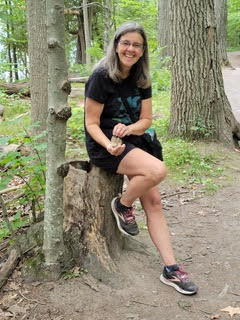Wendy Powley

Associate Professor, Queen’s School of Computing, Queen’s University
The School of Computing at Queen’s University in Kingston, Ontario has one of the highest percentages of female students in undergraduate Computer Science in Canada. In large part, that is due to the outstanding work and dedication of Wendy Powley.
Wendy’s passions are computer science education, teaching and outreach. For more than 30 years, Wendy has personally mentored and inspired thousands of women across the country and internationally and has worked tirelessly to celebrate and connect Canadian women in computing.
Computer science and teaching are far from Wendy’s original plan, as a high-school student, to work as a flight attendant – even though she had never been on an airplane. When her guidance counsellor pointed out that she wasn’t tall enough for that career, she decided to pursue studies in Psychology and Education instead in order to work with children with intellectual disabilities. It was her first job after graduation, as a research assistant on a study in psychology and urology at Queen’s University, that introduced her to computer science. “I taught people how to urinate!” recalls Wendy. “The study was on how biofeedback could be used to help people who weren’t able to properly empty their bladders. I was tasked with analyzing data collected by the toilet and through EMG (electromyography).”
This first experience with using computers to solve real-world problems inspired Wendy to pursue a master’s degree in Computer Science and launched her career as a Research Associate and, eventually, a professor at Queen’s University.
Wendy teaches more than 1,000 students per year and she especially enjoys teaching those in their first year. Sharing her first-hand understanding of Impostor Syndrome and her struggle to learn to code has helped students, many of them women, understand that these challenges are normal and that they can be overcome. Wendy’s support has motivated many students to pursue or continue their studies in Computer Science.
Wendy’s experience helped her understand the need to encourage students outside of the School of Computing to learn to code. She restructured a computing course for students in the humanities to include mentorship by lab assistants in the weekly hands-on labs. This resulted in the enrollment of a record numbers of female students in a second course in computing.
In 2003, Wendy founded Queen’s Women in Computing (QWIC) for female-identifying students and faculty. Under Wendy’s leadership, QWIC is currently run by students, with upper year students mentoring their younger counterparts and a recently-introduced program includes computer science alumni as mentors and role models.
Wendy’s outreach and support of women to pursue studies and careers in Computer Science is not limited to Queen’s University. Wendy founded what is now the premier Canadian conference for women in computing in 2010. Wendy has led the organization of CAN-CWiC, the annual Canadian celebration of women in computing, for 12 years. Through Wendy’s vision and leadership, the conference has grown to a national annual event that attracts more than 750 attendees from universities, colleges and tech companies across Canada. CAN-CWiC provides a unique opportunity for students to hear from keynote speakers, presenters and panelists who share their stories of professional challenges and achievements. The conference also offers graduate students a chance to present their research to female faculty members for their feedback. Students who attended CAN-CWIC have progressed to roles in the tech industry and are invited back to the conference to serve as role models and mentors for students and young professionals. In 2023, a Mentoring Circles program was added, for senior faculty to discuss research and teaching issues in academia with junior faculty members and graduate students.
Wendy also works with young women in high school through the National Center for Women & Information Technology (NCWIT) Aspirations in Computing Awards Canada program to inspire them to pursue careers in technology. Over 100 female students in Canada received awards through the program in 2022. AiC award winners are invited to attend the CAN-CWiC conference to meet with undergraduate and graduate students as well as industry professionals.
Wendy’s dedication to promoting gender diversity in computing was recognized by CS-Can|Info-Can, Canada’s national organization for computer science professionals, in 2022 with the organization’s Distinguished Service Award for her outstanding service to the Canadian computer science community.
As Wendy reflects on her career, she says “I would never have imagined I would be teaching full time.” After attaining her master’s degree, she worked as a project manager on research study on air traffic control at the Royal Military College and a range of projects in the Queen’s School of Computing prior to being hired as a professor in the school. And, as she looks to the future, Wendy plans to focus on growing the Aspirations in Computing Awards and looks forward to resuming travel after three years of a pandemic-imposed break of meeting with family, friends and colleagues around the world.
Wendy’s tremendous work on promoting women in computing is perhaps best expressed by her former student, Nailah Ogeer, who recently posted on LinkedIn: “Wendy Powley was my first female mentor in computer science 20 years ago in university. She helped me in so many ways throughout the years. After attending CAN-CWiC 2022, I invited Wendy to come talk to our Women in Tech group at work. I asked her what made her think about organizing the first event in 2010. She said, ‘I wanted to bring the conference to my students’ and ‘I want my students to hear from ladies in the real world.’ She also told us that it is so important that women in industry empower girls to join technology. Thank you, Wendy, for all you do for the community.”
You can see more of Wendy’s impact in the community in the visualizations below:
Do you have an Impact Story to share? Reach out to us at connections@profoundimpact.com for a chance to have your story featured in an upcoming newsletter!